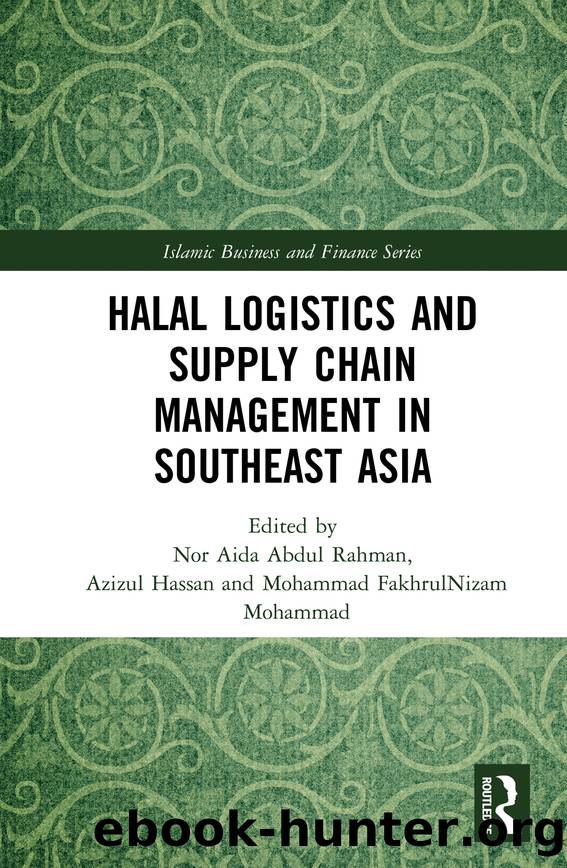Halal Logistics and Supply Chain Management in Southeast Asia by Abdul Rahman Nor Aida; Hassan Azizul; Mohammad Mohammad Fakhrulnizam

Author:Abdul Rahman, Nor Aida; Hassan, Azizul; Mohammad, Mohammad Fakhrulnizam
Language: eng
Format: epub
Publisher: Taylor & Francis Group
Published: 2021-04-15T00:00:00+00:00
Figure 9.1 Areas of Halal logistics.
Source: Zhan, Watcharapun, Wangbenmad and Sangkapan (2016).
Halal logistics in Thailand
Thailand utilizes special logistics in working with its neighbours: Laos, Cambodia, Malaysia, Myanmar and Southern China. Additionally, Halal products can be sent from the Gulf of Thailand and Andaman Sea to the Middle East and to European countries. Halal products and services are increasingly recognised globally as an indicator of a new level of safety and quality assurance. Most small industrialists have bravely involved themselves in Halal products and services in to the global market (Zhan et al., 2016).
Manufacturers in Thailand are more aware of the consumers, increased interest in Halal goods, and there are chances for growth in the existing Halal industry. These Halal products not only satisfy the needs of the Muslim community but also focus on the general consumers who are aware of the health and general benefits of these products. As for the growing potential, more logistics industrialists are involved in this market, even though a lot of adjustments and improvements may be required for supply operation. This is because Halal goods must be processed and handled with great care, according to the Islamic teaching, and should be free from any impurities (Logistics Manager, 2017). Thailand is the worldâs first country to have its own Halal Science Centre due to its objective to become number one in Halal industry, its three institutions striving to change perspectives and raise the status of the Halal standard in the country (Halal Focus, 2017). Beyond this, the Halal Science Centre at the Chulalongkorn University is focussing on research and development of Halal products in Thailand, while âPejabat Pattaniâ is focussing on production and entrepreneurship, such as improving PKS and starting up industrial factory and agriculture (Halal Focus, 2017).
Presently, there are few Halal service industrialists because of very difficult procedures. Some suppliers may look to Halal goods as a market with limited opportunities, though in fact more than 7 million people use Halal goods in Thailand, to the extent that the area is attractive for those who intended to invest (Nikkei Asian Review, 2017). To ensure that Thailand becomes the worldâs first country to have its own Halal Science Centre, Yusen Logistics of Japan plans to build a warehouse, complying with Islamic Laws, in Thailand, with the purpose of meeting the transportation demand in South-East Asian countries such as Indonesia, which has the biggest Islamic population, and Malaysia. This would be the first Halal warehouse in Thailand. Besides, what makes Yusen Logistics of Japan unique is that the workers would have access to forklift equipment and a special bathroom. Lorries would carry Halal goods separately from other goods (Nikkei Asian Review, 2017).
The core of successful Halal logistics management is the seperation of Halal and non-Halal products. Islamic law sets various restrictions on products; food and consumer goods, such as cosmetics, cannot come into contact with pork or alcohol, for instance. This requires not only separate storage for Halal and non-Halal products but separate warehouse facilities and equipment as well.
Download
This site does not store any files on its server. We only index and link to content provided by other sites. Please contact the content providers to delete copyright contents if any and email us, we'll remove relevant links or contents immediately.
Time Management Made Easy: How to Cultivate New Habits, Improve Productivity and Get Things Done by Joshua Strachan(2416)
The 7 Habits of Highly Effective People by Stephen R. Covey & Sean Covey(2263)
The Concise Laws of Human Nature by Robert Greene(1901)
Doesn't Hurt to Ask by Trey Gowdy(1635)
Primal Leadership by Daniel Goleman(1273)
Hook Point: How to Stand Out in a 3-Second World by Brendan Kane(1233)
Don't Sweat the Small Stuff...and It's All Small Stuff by Richard Carlson(1115)
HBR's 10 Must Reads 2021 by unknow(1094)
The Power of 100! by Shaun King(1073)
Amazon Unbound by Brad Stone(1040)
100 Things Successful People Do by Nigel Cumberland(1026)
HBR's 10 Must Reads 2021 by Harvard Business Review(1003)
Master of One by Jordan Raynor(1002)
The Job Closer by Steve Dalton(993)
Lives of the Stoics by Ryan Holiday & Stephen Hanselman(965)
Declutter Your Mind: A step by step guide to learn to control your thoughts, stop worrying, relieve anxiety and eliminate panic attacks and negative thinking by Mia Chandler(964)
The Book of Hope by Jane Goodall(867)
Conflicted by Ian Leslie(865)
Coders at Work: Reflections on the craft of programming by Peter Seibel(844)
